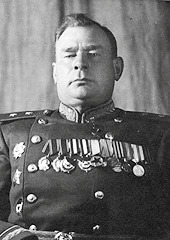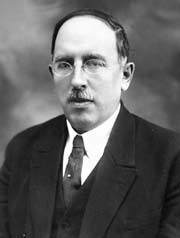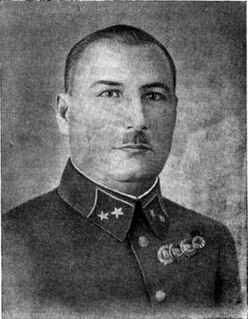 W
WAlexey Osipovich Akhmanov was a Soviet Army lieutenant general and a Hero of the Soviet Union.
 W
WOskar Johann Viktor Anderson was a Russian-German mathematician of Baltic German descent. He is best known for his work on mathematical statistics and econometrics.
 W
WVasìly Onisimovich Afanàsiev was a revolutionary and a propagandist of Marxism as well as a prominent activist and supporter of the Russian and international Socialist movement. He was among the active members of the RSDLP and was a Menshevik. In 1925, Anisimoff became the deputy head of the economic department of the Supreme Soviet of the National Economy of the RSFSR, managing the "Exportles" trust.
 W
WAleksandr Erminingeldovich Arbuzov was a Russian Empire and Soviet chemist who discovered the Michaelis–Arbuzov reaction.
 W
WSadreddin Nizamettinovich Maksudov or Sadri Maksudi Arsal was a prominent Turkish statesman, scholar and thinker of ethnic Tatar origin.
 W
WNikolai Ivanovich Ashmarin was a Russian and Soviet linguist, Turkologist and corresponding member of the Academy of Sciences of the USSR (1929).
 W
WFyodor Alexeyevich Bakunin was a Soviet Army major general. Bakunin briefly served in the Imperial Russian Army in 1917 and in 1919 joined the Red Army, fighting in the Russian Civil War. He became an officer and in 1938 was appointed to lead the 11th Rifle Division. A year later Bakunin became commander of the 2nd Rifle Corps. Nearly a year later, he became commander of the 61st Rifle Corps. The corps fought in the Battle of Smolensk after the German invasion of the Soviet Union. Bakunin led the corps during the Siege of Mogilev, in which it was destroyed. He escaped the encirclement and became a teacher at the Frunze Military Academy. In the fall of 1943 he was given deputy command of the 10th Rifle Corps and in May 1944 command of the 63rd Rifle Corps. Bakunin led the corps until 1947, when he retired.
 W
WVasily Ivanovich Chapayev or Chapaev was a celebrated Russian soldier and Red Army commander during the Russian Civil War.
 W
WNikolai Alexandrovich Demert was a Russian writer, journalist and publicist.
 W
WLidija Nikolaevna Figner (1853-1920), was a Russian revolutionary and a prominent member of the Narodniks. She was the sister of Vera Figner.
 W
WVera Nikolayevna Figner Filippova was a revolutionary political activist born in Kazan Governorate, Russian Empire, into a noble family of ethnic German and Russian descent.
 W
WOlyk Ipai was a Mari poet.
 W
WValery Ivanovich Jacobi was a Russian painter and an older brother of Pavel Jacobi (1842–1913), a notable revolutionary and ethnographer.
 W
WWładysław Kuncewicz was a Polish swimmer. He competed in the men's 100 metre freestyle event at the 1928 Summer Olympics.
 W
WMaxim Dormidontovich Mikhailov was a Russian bass. His son, Igor Mikhailov (1920-1983) was the bass of the Bolshoi for several decades. His grandson Maxim Mikhailov (1962–2018) was also a bass singer.
 W
WGavril Ilyich Myasnikov, also transliterated as Gavriil Il'ich Miasnikov, was a Russian communist revolutionary, a metalworker from the Urals, who participated in the Revolution of 1905 and became a Bolshevik underground activist in 1906. Tsarist police arrested him and he spent over seven years at hard labor in Siberia. In 1917, Myasnikov was active in factory committees, the soviet, and the Bolshevik party in his hometown of Motovilikha and in Perm.
 W
WMišši Śeśpĕl was a Chuvash poet. Although he died prior to the establishment of the Soviet Union in December 1922, the Bolshevik writer-revolutionary is considered a founder of Soviet Chuvash poetry.
 W
WPyotr Grigoryevich Shafranov was a Soviet Army colonel general and Hero of the Soviet Union.
 W
WBurhan Shahidi was a political leader in Xinjiang, China during the 20th century.
 W
WVladislav Petrovich Vinogradov was a Soviet military leader. He fought in the First World War, Russian Civil War and Second World War and ended his military career Lieutenant General of the Quartermaster Corps.
 W
WNikolay Alexeyevich Zabolotsky was a Russian poet, children's writer and translator. He was a Modernist and one of the founders of the Russian avant-garde absurdist group Oberiu.
 W
WPeter Zheltukhin was a Russian, born to a noble family in Kazan gubernia.